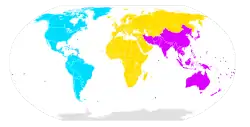The 3-centimeter or 10 GHz band is a portion of the SHF (microwave) radio spectrum internationally allocated to amateur radio and amateur satellite use on a secondary basis. The amateur radio band is between 10.00 GHz and 10.50 GHz, and the amateur satellite band is between 10.45 GHz and 10.50 GHz. The allocations are the same in all three ITU regions.[1]
List of notable frequencies

ITU regions.
Region 1
Region 2
Region 3
- 10.3681 GHz Region 2 narrow band calling frequency[2][3]
- 10.3682 GHz Region 1 narrow band calling frequency[4]
- 10.3683 to 10.3684 GHz Region 2 propagation beacons[2][3]
- 10.36875 to 10.36899 GHz Region 1 propagation beacons[4]
Wideband FM Channels
Common Wideband FM frequencies used with gunnplexers.
Operation is in full-duplex with a 30 or 90 MHz split:
- 10.220 GHz
- 10.250 GHz †
- 10.280 GHz †
- 10.310 GHz
- 10.340 GHz
- 10.370 GHz ‡
- 10.400 GHz
- 10.430 GHz
† Most commonly used frequency pair for gunnplexers in North America. (10.200 to 10.300 GHz is reserved for gunnplexers in the ARRL Band Plan.[3])
‡ Should only be used if interference is not caused to narrow-band stations.
See also
References
- ↑ "FCC Online Table of Frequency Allocations" (PDF). 47 C.F.R. Federal Communications Commission. August 13, 2015. Retrieved October 27, 2015.
- 1 2 "IARU Region 2 Band Plan" (PDF). International Amateur Radio Union Region 2. October 14, 2016. p. 13.
- 1 2 3 "Band Plan". American Radio Relay League. Retrieved February 18, 2015.
- 1 2 "VHF Managers Handbook". 7. International Amateur Radio Union Region 1. January 2015. p. 50. Archived from the original (PDF) on June 17, 2018. Retrieved October 27, 2015.
This article is issued from Wikipedia. The text is licensed under Creative Commons - Attribution - Sharealike. Additional terms may apply for the media files.